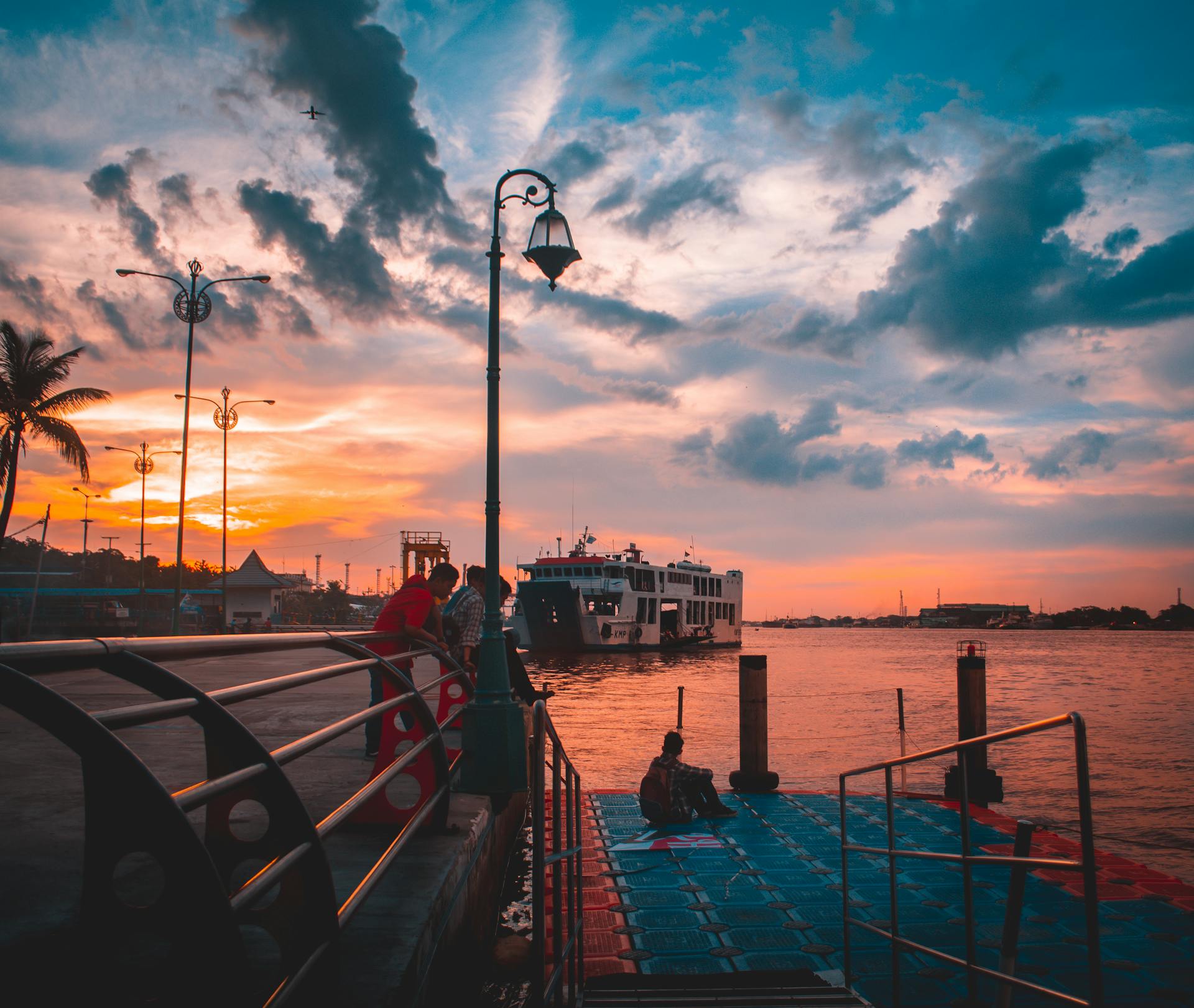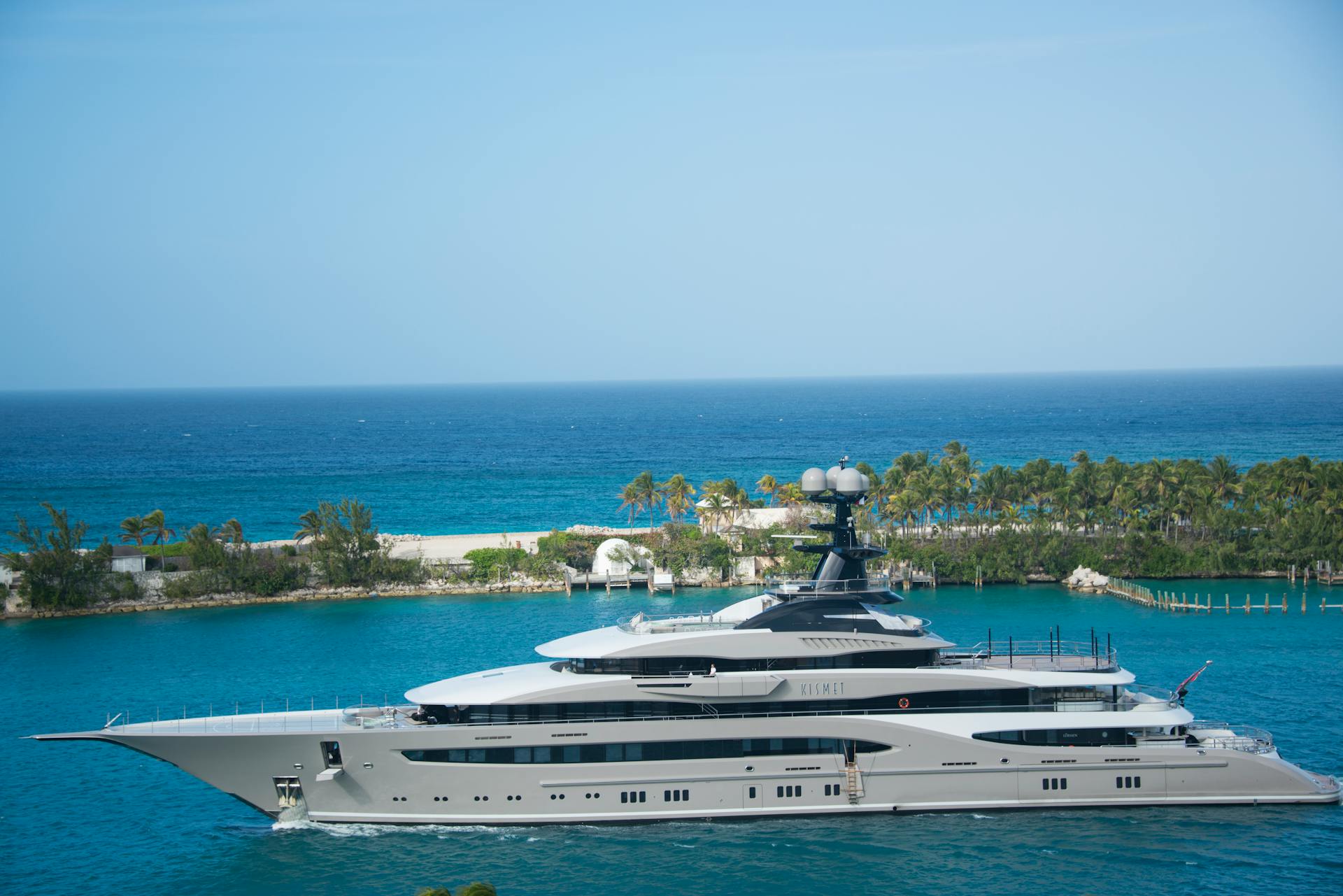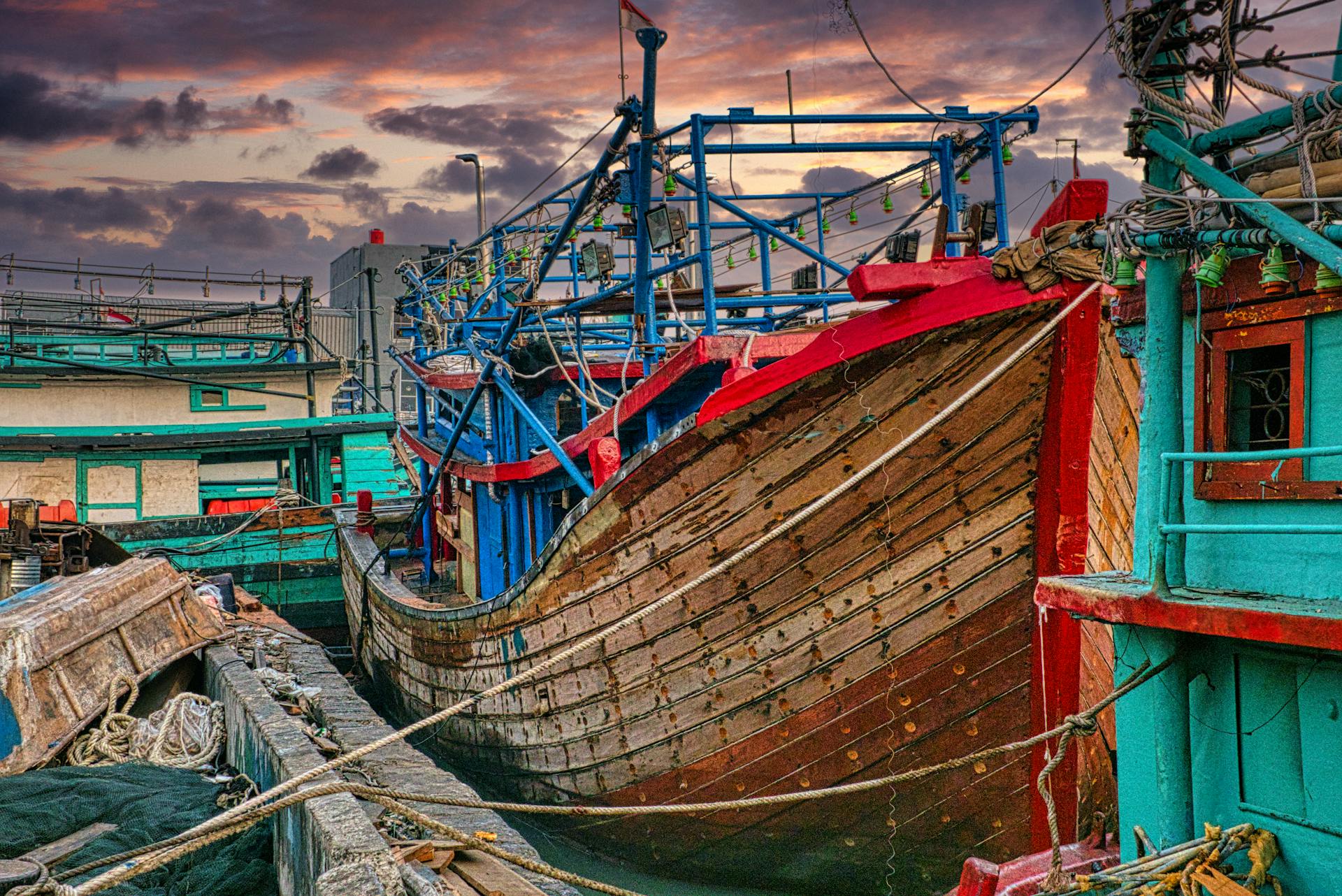
Indonesia is a vast archipelago with over 17,000 islands, making its ports a crucial part of the country's economy.
The country's strategic location makes it a key player in international trade, with many major ports serving as gateways for goods and commodities.
The busiest ports in Indonesia are located in major cities such as Jakarta, Surabaya, and Semarang.
These ports are equipped with modern facilities and infrastructure, making them efficient and effective hubs for trade and commerce.
Ports in Indonesia
Indonesia has a vast array of ports, with over 1,000 small ports and 27 major ports.
The country's strategic location at the crossroads of Asia and the Pacific makes it an important hub for international trade.
The Port of Tanjung Priok in Jakarta is the largest and busiest port in Indonesia, handling over 50 million tons of cargo annually.
It's a major gateway for imports and exports, including oil, coal, and containers.
Major Ports
Indonesia has a robust port infrastructure, which is a testament to its strategic location as a major trade hub in Southeast Asia.
The country has at least eight major ports, serving as national and global trade gateways.
Java Ports
Java Ports are a crucial part of Indonesia's maritime trade, with Jakarta Port being the largest and busiest in the country.
Located on the northern coast of Java island at the mouth of the Ciliwung River, Jakarta Port is situated around 116 nautical miles east-southeast of Panjang Port on Sumatra island.
The port has 20 terminals for accommodating various types of cargo, including general cargo, liquid bulk, dry bulk, and containers. It can handle 45 million tonnes of cargo and about 8 million TEUs.
Jakarta Port is a significant regional employer with more than 20,000 workers, and its economy depends on manufacturing, financial services, and trade.
Explore further: List of Busiest Ports by Cargo Tonnage
Specific Ports
The Port of Belawan is the busiest facility in Indonesia outside of Java, handling around 2000 vessels, 12,000,000 tonnes of cargo, and 410,000 TEUs annually.
It serves Medan, the biggest city in North Sumatra, and is a major exporter of palm oil, rubber, forest products, tea, coffee, and tobacco. The port has four wharves, including the Belwawan Lama, the Ujung Baru, the ferry wharf, and the Citra Wharf.
The Belawan ferry terminal at Luar Negeri spans 600 square meters and can accommodate 800 people.
Sumatra
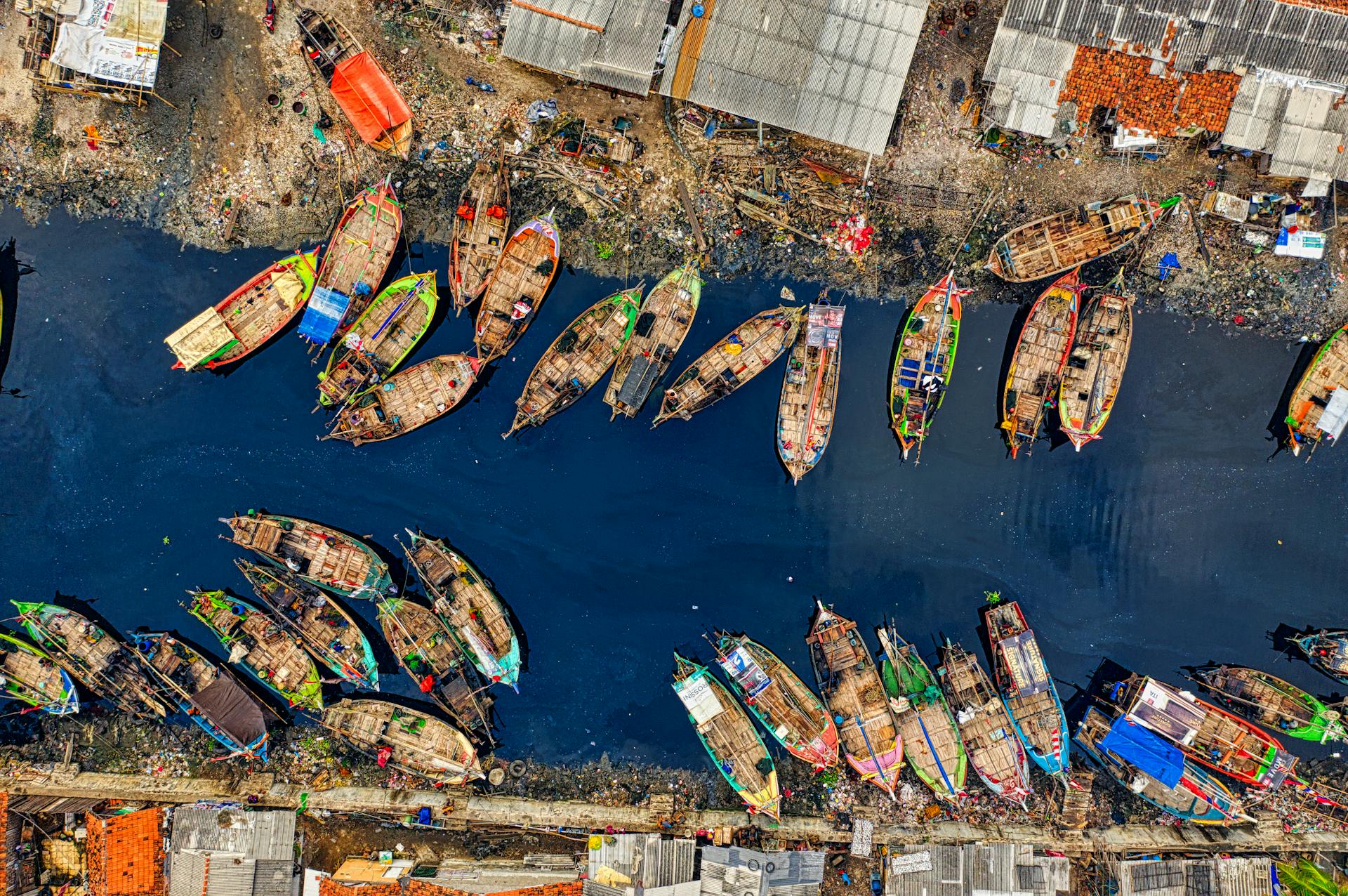
Sumatra is a significant island in Indonesia, boasting a diverse range of ports that play a crucial role in the country's maritime trade. The Port of Belawan is located on the northeast coast of Sumatra, facing the Strait of Malacca, and serves Medan, the biggest city in North Sumatra.
It's Indonesia's busiest port outside Java, handling a diverse range of cargo, including palm oil, rubber, tea, and tobacco. Approximately 2000 vessels and 12 million tonnes of cargo pass through annually.
The Port of Jambi, also known as Talag Duku, is located approximately 90 nautical miles from the entrance to the Batang Hari River on the east coast of Sumatra. It's the shipping and trading hub of Jambi province, handling around 5000 vessels and 480,545 tonnes of cargo every year.
Sumatra's southern side is home to the Dumai Port, which primarily serves as a crude oil shipment port managed by PT Caltex Pacific Indonesia. With an adjacent oil refinery operated by Pertamina, the port handles general cargo, fertilizers, rice, and log exports, welcoming over 6000 ships annually.
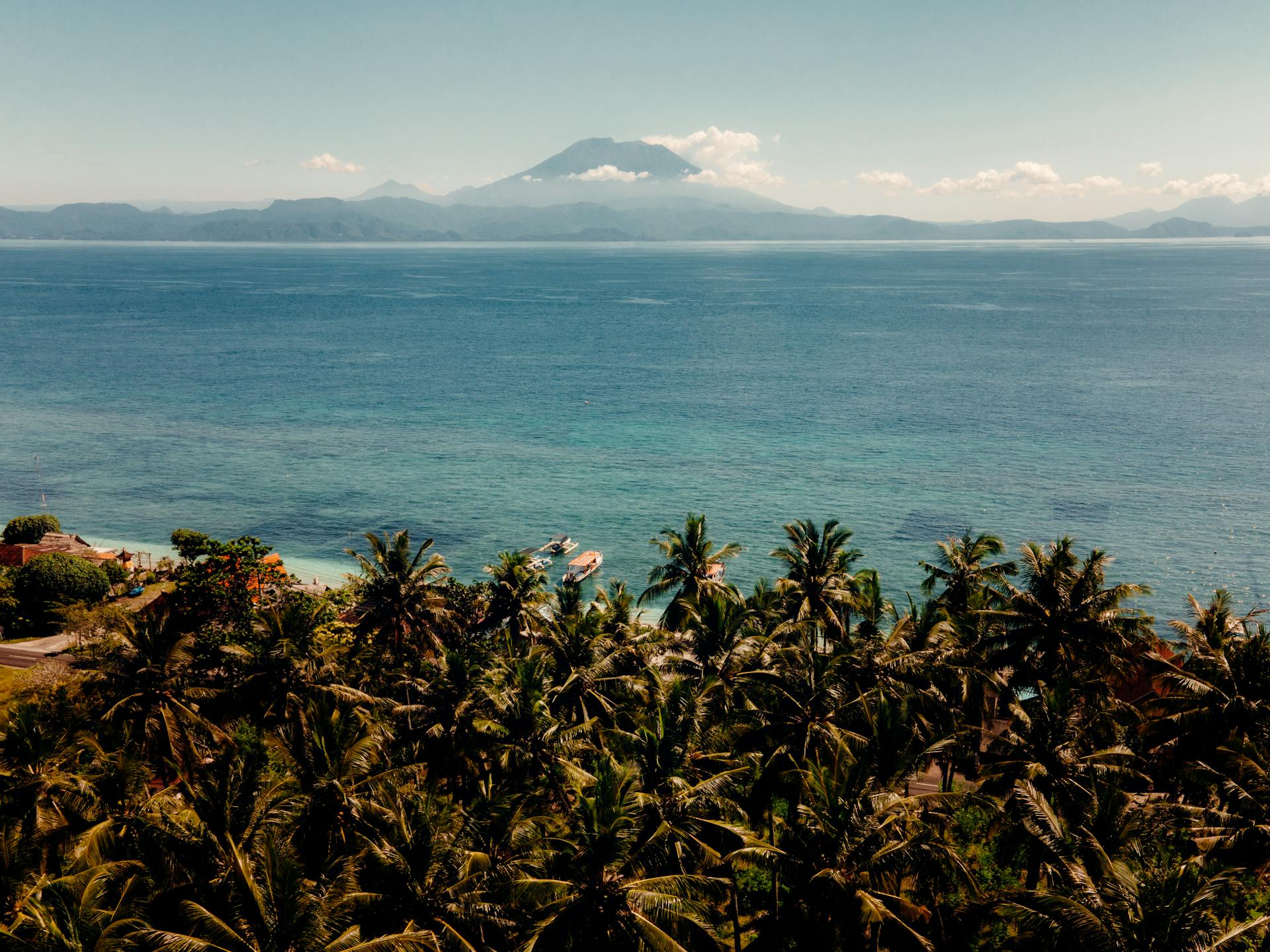
Here's a list of some of the notable ports in Sumatra:
- Port of Belawan
- Port of Jambi (Talag Duku)
- Dumai Port
- Port of Teluk Bayur
- Port of Kuala Tanjung
- Port of Bakauheni
- Port of Batu Ampar
- Port of Krueng Geukueh
Each of these ports plays a vital role in facilitating trade and commerce in the region, and understanding their unique characteristics and functions can help businesses and individuals navigate the complexities of maritime trade in Sumatra.
Sulawesi
Sulawesi is a significant region in Indonesia, boasting a number of important ports.
The Port of Makassar in Makassar, South Sulawesi is one of the key ports in the area.
Kendari in Southeast Sulawesi is another notable port.
The city of Gorontalo in Gorontalo is also home to a major port.
Here are the main ports in Sulawesi:
- Makassar, South Sulawesi
- Kendari, Southeast Sulawesi
- Kolonodale, North Morowali Regency, Central Sulawesi
- Gorontalo, Gorontalo
- Bitung, North Sulawesi
Nusa Tenggara
Nusa Tenggara is a region in Indonesia with a number of notable ports.
The Port of Gilimanuk, located in Jembrana Regency, Bali, is one of the key ports in the area.
Tanjung Benoa in Badung Regency, Bali, is another important port.
Padangbai in Karangasem Regency, Bali, is a port that serves the island of Bali.
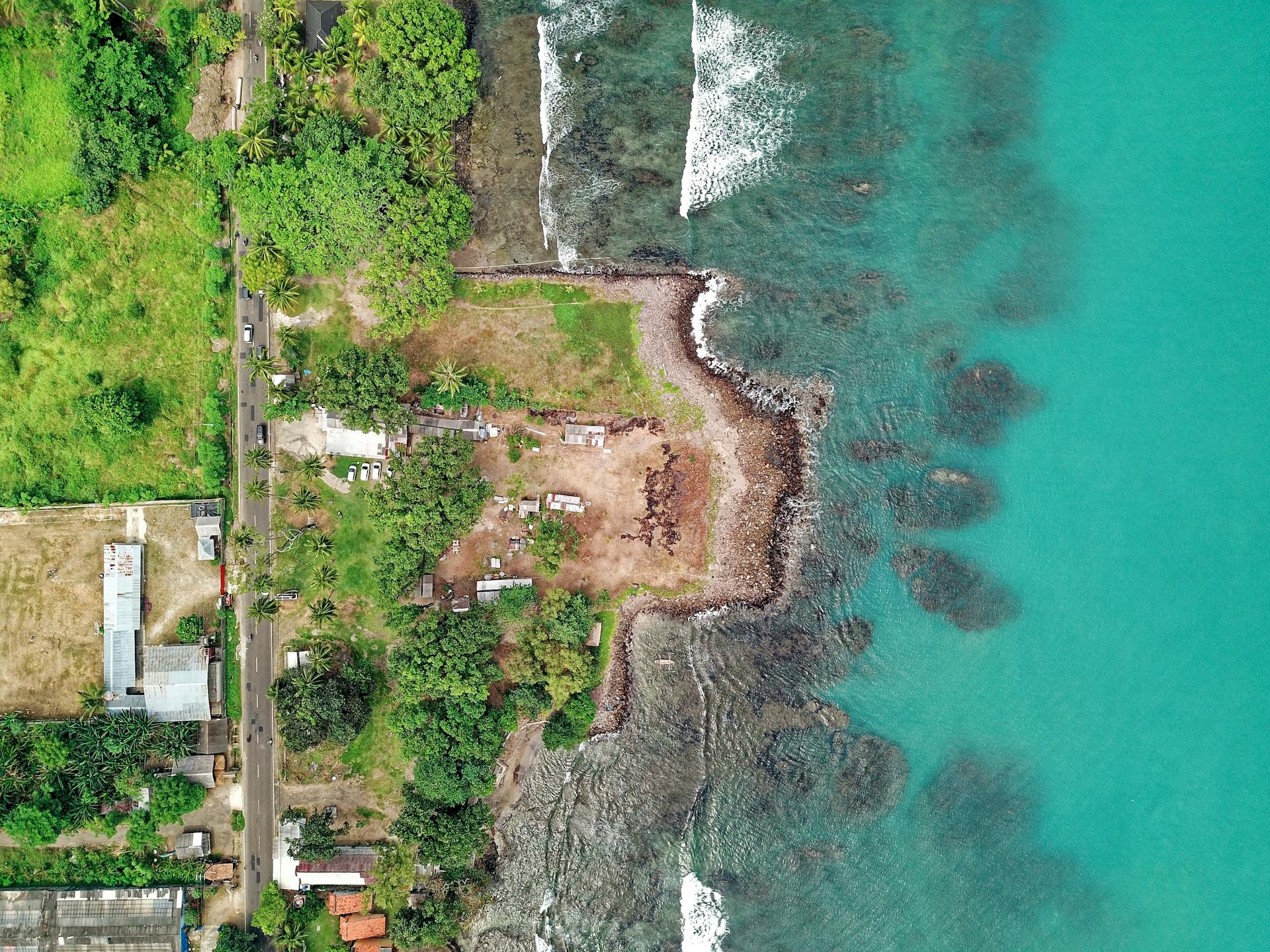
Port of Lembar in West Lombok Regency, West Nusa Tenggara, is a major port in the region.
Waingapu in East Sumba Regency, East Nusa Tenggara, is also a port worth mentioning.
Here's a list of some of the notable ports in Nusa Tenggara:
- Port of Gilimanuk, Jembrana Regency, Bali
- Tanjung Benoa, Badung Regency, Bali
- Padangbai, Karangasem Regency, Bali
- Port of Lembar, West Lombok Regency, West Nusa Tenggara
- Waingapu, East Sumba Regency, East Nusa Tenggara
Maluku and Papua
Maluku and Papua are regions in Indonesia with several notable ports.
The port of Obi in South Halmahera Regency, North Maluku is one of the notable ports in the area.
Port of Dobo in Aru Islands Regency, Maluku is also a significant port in the region.
Port of Sorong in Sorong, West Papua is another important port in the area.
The following ports in Papua are also worth mentioning:
- Amamapare, Mimika Regency
- Port of Depapre, Jayapura Regency
- Port of Biak, Biak Numfor Regency
The Indonesia Port Corporation has a presence in the region with several corporations:
- Indonesia Port Corporation I
- Indonesia Port Corporation II
- Indonesia Port Corporation III
- Indonesia Port Corporation IV
Trade and Infrastructure
Indonesia's ports are gateways to international trade, linking land and sea transportation networks. They handle various types of cargo, enabling exports, imports, and transit shipments.
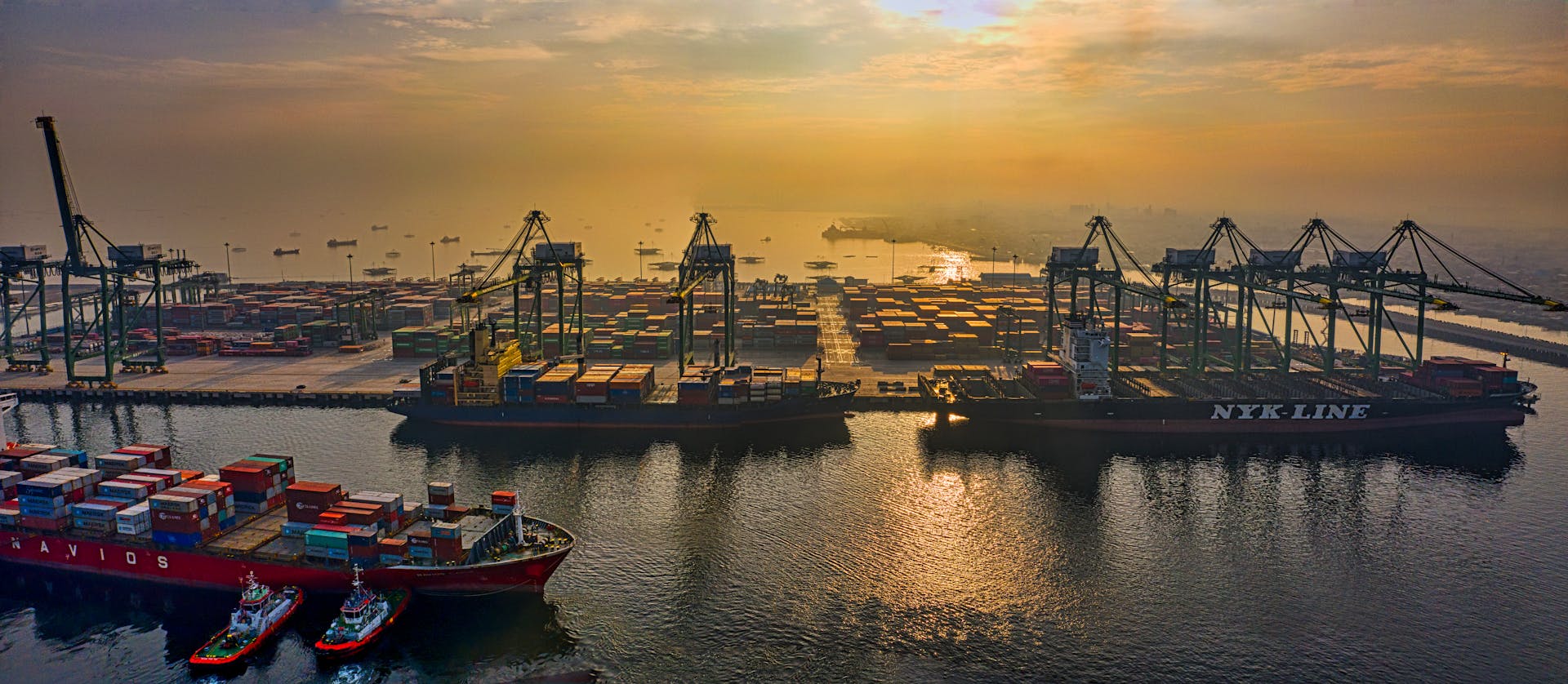
The country's extensive coastline, bordered by the Indian and Pacific Oceans, attracts foreign investors. Indonesia's maritime sector facilitates the movement of goods and people across its vast territory.
Indonesia's international maritime cargo traffic surpassed 506 million metric tons in 2022, placing it among the leading Southeast Asian countries in cargo throughput.
Discover more: Gujarat Maritime Board
Infrastructure
Indonesia's ports are gateways to international trade, linking land and sea transportation networks. They handle various types of cargo, enabling exports, imports, and transit shipments.
Ports require extensive infrastructure, including deep-water berths. This allows large ships to dock and unload their cargo efficiently.
Seamless transshipment between different modes of transportation is facilitated by ports. This is crucial for the smooth flow of goods and cargo.
Investments in advanced technologies have enhanced operational efficiency and optimized cargo handling at Indonesian ports.
A fresh viewpoint: Transportation in Thunder Bay, Ontario
How to Boost Indonesia's Growth
Indonesia's geographical advantages make it an attractive location for foreign investors, with its extensive coastline and strategic position in Southeast Asia.
Its maritime sector is a key driver of the economy, with international maritime cargo traffic surpassing 506 million metric tons in 2022.
However, despite this robust flow, Indonesia faces challenges in connectivity and trade costs, with a liner shipping connectivity index below 38.26 as of the fourth quarter of 2023.
One way to boost Indonesia's growth is by investing in its port infrastructure, which would help reduce trade costs and increase efficiency.
Key port cities such as Jakarta, Surabaya, and Medan are crucial hubs for goods handling and international trade, with Tanjung Priok and Tanjung Perak being notable examples.
By improving the connectivity and efficiency of these ports, Indonesia can unlock its maritime economic potential and drive growth.
For another approach, see: King Salman Global Maritime Industries Complex
Frequently Asked Questions
How many ports are there in Indonesia?
Indonesia has over 2000 ports, making it a significant hub for international trade. Most of these ports are managed centrally by the government.
Sources
Featured Images: pexels.com
